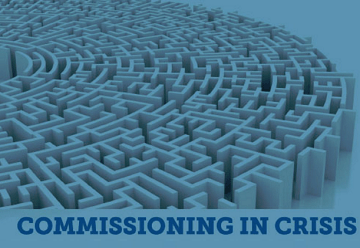Commissioning in Crisis

Lloyds Bank Foundation’s latest report Commissioning in Crisis highlights how commissioning processes penalise small charities in particular.
Since the outlook for public sector settlements changed in 2010, public services across the country have felt more than the pinch. Six years in and the outlook continues to be dire. The Mayor of Liverpool has declared the city is running out of money, with other councils not far behind. So where are we heading now?
It’s helpful to think about public services as safety nets: they are there, ever ready to catch you when you’ve taken a tumble, and are needed now more than ever. The public sector and big charities are the first layer: loosely woven and wide reaching, they support a lot of people over a large area. But because of their structure, bigger organisations don’t have the specialism or subtle knowledge needed to reach everyone. Smaller charities are the fine mesh, armed with local expertise and understanding to provide close-fitting support. They may cover smaller areas but they are tightly woven into the community, providing security even to those who have slipped through the first net.
Now imagine both of those nets being snipped away by budget cuts: holes get bigger, gaps are harder to repair. Trying to fix a big net is difficult enough with dwindling yarn, but trying to patch up a fine mesh with the same yarn is just nonsensical. The tightly-woven safety net provided by small charities is increasingly being cut out of the support system.
This is what is happening to public services being commissioned – the way central and local government decides who delivers services, such as support for addiction, homelessness or domestic abuse, to a community. While there is no doubt that everyone, commissioners and service providers, are being squeezed by cuts, Lloyds Bank Foundation’s latest report, Commissioning in Crisis, highlights some of the ludicrous processes used to bridge the gap left by too little money. These approaches penalise small charities in particular, excluding them from bidding for, let alone winning, contracts, leaving many deprived of funding and on the brink of shutting up shop.
Widespread closure of small charities will be to the detriment of us all. They are able to tackle disadvantage in our society in a distinctive way that bigger charities, businesses and the public sector cannot. They play a critical but often unseen role and their small size and local connection allows them to be flexible, responsive and deeply embedded into their community – we know, because we’ve seen them do this through funding them for over 30 years.
But the way central and local government are selecting and paying for services is shutting out smaller charities, cutting off the funding lifeline that helps ensure everyone can access the support they need. Small charities don’t have the resources to jump through hoops just to respond to absurd demands. Through the report, we’ve heard from charities who’ve had to supply a hard-hat policy when bidding for a mental health contract, because the commissioner used the same processes they did when trying to find a builder. Or having to write a 27,000 word bid, the length of a short novel.
This needs to stop. We urgently need common sense reforms to ensure small charities are able to compete for contracts on a level playing field. This isn’t about spending more money, but making better use of the funds that are available. Local commissioners need to get to the heart of how small charities operate, simplify processes and focus on the long-term value of effective service delivery, rather than on short-term time and cost savings – reforms which bring benefit to them as commissioners as well as to all those accessing services. We need central government to challenge poor practices, hold commissioners to account and improve transparency to ensure smaller charities get a fair chance. This is vital to ensure not only their continued survival but survival of the people and communities they support.
Paul Streets, Chief Executive of Lloyds Bank Foundation,